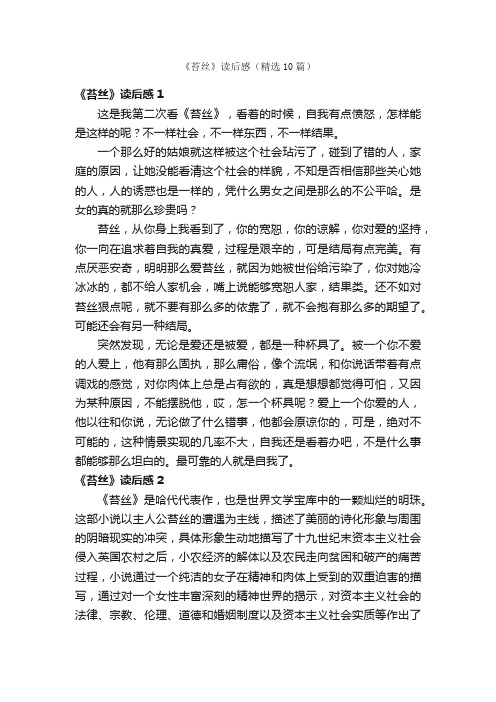外国语学院11级英美文学基础(1)考查A 苔丝读后感
《苔丝》读后感

《苔丝》读后感《苔丝》读后感认真品味一部名著后,相信大家的视野一定开拓了不少,何不写一篇读后感记录下呢?你想知道读后感怎么写吗?以下是店铺为大家收集的《苔丝》读后感,希望能够帮助到大家。
《苔丝》读后感1《苔丝》这本书是英国作家托马斯·哈代的作品,当之无愧的世界名著,我买的是译林出版社的版本。
我从小到大买世界名著还是蛮认准这家出版社的,翻译的不错并且每本书的序都写的很好。
建议先读书最后再去看序言,不然剧透过后读书的意愿就没有那么强烈了。
这本书的剧情犹如过山车一般,起伏非常的大有的时候主人公的情绪变化甚至就在一瞬间。
全书的第一页写着:苔丝,一个纯洁的女人。
这便是全书讨论的主题了,苔丝是否是一个纯洁的女人?我给的答案是肯定的。
个人认为这本书不仅好在作者大师般的写作功底,他有用大量的环境描写、侧面描写等来渲染,这本书更可贵之处是可以引发读者的思考的。
全书我还很喜欢的一个点就是作者把人物塑造的很好。
在许多作品中都会或多或少存在那么一两个完美的人,他们的言行举止竟显人性的光辉。
但是这本书的主角们都不是完美的。
男主角爱的真诚,他丝毫不嫌弃苔丝的贫穷,我一开始还以为是那种霸道总裁的戏码,让人直呼好一个痴情男,奈何他却十分在意女性的贞洁和家族的名望。
男二号是个没落的贵族子弟,他嚣张跋扈、自大狂妄,虽说在故事中有点浪子回头的感觉,有一段时间还给别人去说道,但是很遗憾“江山易改,本性难移”,一次意外的邂逅还是将他打回原形。
女主角,苔丝,是全书中近乎完美的角色,她美丽、善良、勤劳、忠诚,拥有很多很多优秀的品质。
但是她爱的卑微又缺少足够的定力,最后就是她为数不多的缺点导致了悲剧的化身。
我看到女性题材的文学作品就很容易与《简爱》这本书进行对比,当然《简爱》一直都是我心中这类小说中的top1。
我看《苔丝》看到一半的时候觉得这两本书的母题不是一样的吗?但是等我看完后我发现虽说都是以女性为主人公和书名但是侧重的主题是不一样的。
《苔丝》读后感

《苔丝》读后感苔丝读后感篇一这是我第二次读这篇小说了,可从次数上来看虽是第二次,实质上只能说是第一次,或者说是一次多一点点。
我第一次看这篇小说的时候才只是一个中学生,对文学作品的理解能力有限,而且读得也很粗略,那时,我对《苔丝》的唯一印象就是挺好看的,苔丝这个人物挺可怜的,除此以外便所剩无几了,根本没有把自己融入整个情节中去,根本没有对苔丝这个悲剧性的人物作过任何有意识的评价,根本没有想过苔丝一步一步走向毁灭是与其性格,与她所处的环境是如此密不可分。
这一次阅读,我不敢说我已经看懂了,但我对整个情节有了比以往更深刻的了解。
《苔丝》的作者托马斯哈代在这篇小说中体现出了他悲观的宿命论,主人公苔丝陷入悲惨境地,但她无论如何挣扎都无济于事,改变不了命运的安排与戏弄,最后走上绝路。
但她走上绝路,绝不像某些低俗小说那样一味追求情节曲折而硬让主人公死去,而是有其一定的必然性。
苔丝天性纯朴,厌恶趋炎附势,她性格中最不容忽视的一点便是她强烈的责任感了,正如苔丝坚决地要把与亚历克德伯的那一段不快的往事告诉她所深爱,并且也深爱她的丈夫安吉尔一样,她原本可以完完全全地把这件事隐藏起来,说像她母亲教她的,然而,苔丝没有,她把这件事原原本本地告诉了安吉尔。
我所说的都是苔丝,也许你会问起安吉尔为什么会接受不了苔丝曾被亚历克玷污并产有一子这一残酷事实而提出与她分居,他不是很爱苔丝吗?难道他对苔丝的爱并不是高尚的吗?那么,我要说,他是因为太爱苔丝了,他心目中的苔丝是如此美丽,如此善良,是一切纯洁的象征,他忍受不了他眼中所见,心目所想的苔丝有任何过错,他努力扼杀自己对苔丝的感情,他觉得那个属于他的苔丝已经不存在了,在他眼前的,已经不是他以前所深恋的苔丝,而是有着苔丝形貌的另一个女人。
新婚之夜,也就是苔丝把往事告诉他的那个夜晚,也就是他们开始分居的那个夜晚,他曾梦游,抱着苔丝走到了树林中,把苔轻轻放在一口棺材中,看过这篇小说的人一定不会忘记他当时所一直重复说的那一句话:死了,死了,苔丝,我的妻子死了,死了。
苔丝读后感

苔丝读后感苔丝读后感苔丝读后感(一):《德伯家的苔丝》是英国著名小说家和诗人托马斯*哈代创作的代表作之一,一百多年过去了,女主人公苔丝也早已树立在世界文学画廊之中,这不仅仅仅正因人们对传统美德有所超越,更正因作品主人公所拥有的人性与灵魂深处的巨大魄力使之成为最动人的女性形象之一。
哈代以小说女主人公苔丝的悲惨命运替西方杯具作了一个形象的阐释,苔丝足以“哀感顽艳”。
苔丝本是一位纯洁美丽又十分勤劳的农村姑娘,她向往人生的真和善,但又时时遭到伪和恶的打击。
苔丝的杯具始于为了全家人生计去远亲家打工,却因年幼无知而被亚雷骗去了处女的贞操,成了一个“堕落”的女生,受到社会舆论的非议,把她看成不贞洁的罪人;苔丝之后与青年克莱相爱,又正因新婚之夜坦诚有污点的过去而被丈夫遗弃,而与近在眼前的幸福失之交臂;出于高度的家庭职责感和自我牺牲精神,苔丝为换取家人的生存而再次违愿沦为亚雷的情妇;最后正因丈夫的回心转意使得绝望的苔丝愤而举起了复仇的利刃,最后成了一个杀人犯,最后不得不付出了生命的代价,导致“象游丝一样敏感,象雪一样洁白”的苔丝最后终被完全毁灭。
苔丝是被哈代理想化了的现代女性。
在哈代的理想世界中,苔丝是美的象征和爱的化身,代表着威塞克斯人的一切优秀的方面:美丽,纯洁,善良,质朴,仁爱和容忍。
苔丝的灵魂是纯洁的,道德是高尚的,但是在资产阶级的道德面前,她却被看成伤风败俗的典型,奉为警戒淫荡的榜样,是侵犯了清白领域的“罪恶化身”。
丢下《苔丝》一书,眼前那个历经磨难,失身而又杀人的女生,却使我想起它们,想起我喜爱的两件事物:黎明与茶花。
黎明,如处子的皮肤,光洁润滑,在明与未明之际,透着希冀与光亮;有一种茶花,叫“雪塔”,她洁白肥硕,细腻如瓷,在寒冷的季节里,傲然怒放,在出尘与入世间,清丽如水,独自芬芳。
也许他们风马牛不相及,但是,我觉得它们同出一处,那便是纯洁。
正正因这一点《苔丝》的故事才更凄凉。
苔丝为什么会有“哀感顽艳”之能呢苔丝的“哀”既有社会的因素,也与她的性格有关。
《苔丝》读后感(精选多篇)

《苔丝》读后感(精选多篇)第一篇:《苔丝》读后感《苔丝》读后感不论我犯过什么错,你都会原谅我吗?——题记苔丝是一个纯洁,善良,美丽的乡村女孩,由于父亲意外得知自己是名门望族的后裔,就派女儿苔丝去同族的亲戚家里认亲,顺便救济一下他们。
苔丝硬着头皮去了,在那里见到了亚雷克,并替他们养鸡。
在这期间,亚雷克不断表达他的爱慕,可是他是一个十足的伪君子,苔丝对他只有厌恶。
没想到,亚雷克竟设法玷污了苔丝。
之后苔丝因怒回家,却怀了孕,还生下了一个孩子。
可她的孩子不久因病夭折。
她又去了奶牛场,在那里遇到了克莱尔。
他是一个有修养,有文化,热爱大自然的人。
他被苔丝那高贵的气质和迷人的外表折服,于是二人结了婚。
苔丝的内心一直很矛盾,她不知道是否要将那件事告诉他。
最终理智驱使她说出了真相。
克莱尔十分生气他离开了苔丝,去巴西做生意。
在这期间,苔丝的生活越发困难,父亲病故,村人驱逐。
在这时,亚雷克却出现了,他做了传教士,可一看到苔丝,宗教就不复存在了。
他答应给苔丝和她的亲人们优越的生活,他还不断的说克莱尔的坏话。
最终,苔丝迫于压力与亚雷克成婚。
而此时的克莱尔也终于能够放下仇恨,回来寻找苔丝。
新婚后的苔丝再次见到克莱尔十分的激动但是她反复地说着“太晚了!太晚了!”苔丝再也忍受不了亚雷克对克莱尔的诋毁,一刀杀死了亚雷克,与克莱尔私奔。
不久,苔丝被警察抓到,处以死刑。
托马斯。
哈代以他极为细腻的笔触描绘了苔丝这一复杂的形象。
苔丝她是一个有向上精神的人。
在当时,她的孩子夭折之后她还是能勇敢的面对,去奶牛场工作。
在克莱尔离开她后她也同样勇敢地面对,坚信克莱尔会原谅她。
她是一个十分有尊严的人。
她即便是穷的的分文没有也不去公公那里要一分钱,她也没有把丈夫给她的珠宝变卖。
她是一个勇敢的战士,她看到丈夫回来后勇敢的对亚雷克反抗,她为了丈夫可以牺牲一切,甚至是生命。
但是,同时她还是一个太善于忍让的人。
她的丈夫离开她,去巴西之后,如果她可以早些给丈夫写信,丈夫或许就可以马上回来。
《苔丝》读后感

《苔丝》读后感读完《苔丝》这本书,我的心情久久不能平静,仿佛自己跟着苔丝经历了她那悲惨又无奈的一生。
苔丝,一个美丽、善良、纯洁的乡村姑娘,本应拥有幸福的生活,却被命运无情地捉弄。
她出生在一个贫穷的农民家庭,家里孩子众多,生活的重担早早地压在了她的肩上。
但即便如此,苔丝依旧保持着乐观和善良,她就像田野里盛开的野花,虽然身处贫瘠的土地,却依然绽放出属于自己的美丽。
在一次偶然的机会中,苔丝去了一个贵族家里做工。
在那里,她遇到了那个改变了她一生的男人——亚历克。
亚历克是个富家子弟,他被苔丝的美貌所吸引,对苔丝展开了猛烈的追求。
可苔丝对他并没有感觉,她的心里只有那份对家乡的眷恋和对家人的牵挂。
然而,单纯的苔丝在亚历克的花言巧语和百般纠缠下,最终失去了自己的贞洁。
这件事情对于苔丝来说,无疑是一场巨大的灾难。
她满心悔恨地回到了家乡,却发现自己已经不再是那个纯洁无暇的姑娘了。
周围人的指指点点和异样的目光,让她感到无比的痛苦和绝望。
她觉得自己已经失去了追求幸福的权利,只能默默地承受着这一切。
就在苔丝陷入人生低谷的时候,她遇到了安吉尔。
安吉尔是个有理想、有抱负的年轻人,他和苔丝一见钟情。
苔丝以为自己终于找到了真爱,找到了那个可以理解她、包容她的人。
她怀着满心的欢喜和期待,和安吉尔走进了婚姻的殿堂。
可是,命运似乎并不愿意放过苔丝。
在新婚之夜,苔丝向安吉尔坦白了自己过去的遭遇。
她以为安吉尔会像他承诺的那样,不在乎她的过去,只爱现在的她。
然而,安吉尔的反应却让她大失所望。
安吉尔无法接受苔丝的过去,他抛弃了苔丝,独自去了巴西。
苔丝再次陷入了绝望之中。
她不明白,为什么自己真心付出,换来的却是这样的结果。
她努力地想要生活下去,为了家人,也为了自己。
她四处打工,受尽了苦难和折磨。
而这时,亚历克又出现了。
他再次纠缠苔丝,并以苔丝家人的生活相威胁。
走投无路的苔丝,为了家人,不得不再次委身于亚历克。
当安吉尔从巴西回来,意识到自己的错误,想要和苔丝重归于好时,一切都已经太晚了。
《苔丝》英文读后感

《苔丝》英文读后感(实用版)编制人:__________________审核人:__________________审批人:__________________编制单位:__________________编制时间:____年____月____日序言下载提示:该文档是本店铺精心编制而成的,希望大家下载后,能够帮助大家解决实际问题。
文档下载后可定制修改,请根据实际需要进行调整和使用,谢谢!并且,本店铺为大家提供各种类型的实用资料,如试题资料、作文大全、语文资料、公文资料、素材资料、古诗文、教案大全、近义词、反义词、其他资料等等,想了解不同资料格式和写法,敬请关注!Download tips: This document is carefully compiled by this editor.I hope that after you download it, it can help you solve practical problems. The document can be customized and modified after downloading, please adjust and use it according to actual needs, thank you!In addition, this store provides you with various types of practical materials, such as test questions, composition encyclopedia, Chinese materials, official documents, material materials, ancient poetry, teaching plan encyclopedia, synonyms, antonyms, and other materials. If you want to know different data formats and writing methods, please pay attention!《苔丝》英文读后感《苔丝》英文读后感读完一本名著以后,相信你心中会有不少感想,不能光会读哦,写一篇读后感吧。
苔丝英文版本读后感(4篇)

苔丝英文版本读后感(4篇)苔丝英文版本读后感(通用4篇)苔丝英文版本读后感篇1About Thomas HardyThomas Hardy (1840---1928), who is an English novelist. His father is a stoneworker, who is fond of music. His parents thought much of the education of their son. He grown up in the Dorset shire, so the environment of there became the main backdrop of his writings. His writings often reflecting the change after capitalism intrude the countries in England and the people&s hard life.At first, Hardy wrote some novels, and in his old age, he worked on poets. The novel Tess of the DUrbervilles was published in the year 1891. Thomas Hardy facing the terror of the war and propagating the love-kindness, he is one of the greatest English writers.The summary of the bookAs is known to all, is the most famous novel of Thomas Hardy. Tess comes from a farmer&s family, the Durbeyfields.One day her father, John Durbeyfied learns that they are descended from the D&Urbervilles, an ancient family. Her mother urges Tess to claim kinship with the remaining D&Urbervilles, so that Tess could marry a gentleman. Unwillingly, the girl comes in contact with the Stoke, D&Urbervilles. There she meets Alec D&Urbervilles. Having received a job of tending to chickens, Tess stays in the D&Urbervilles. Before long the rich but guileful Alec manages to seduce the girl and make her pregnant. Being humiliated and resolute, Tess returns home,and gives birth to the child, who is called Sorrow but dies soon . Without financial support, Tess has to leave home and goes to work at a distant farm, where she meets Angel Claire. After Angel persistent pursuit of Tess, the two fall in love. In the wedding night, Tess admits about Alec D&Urbervilles and the child. She begs for forgiveness, but Angel leaves her in disgust. Tess again returns home alone, only find that her family remains impoverished and she even has no place to stay. In the meantime, Alec D&Urbervilles appears again. He promises to support herfamily, only as a means to make Tess dependent. At the end of hope, the girl jumps into the trap of the shameless man. However, Angel Claire, who is remorseful for his mercilessness comes back, which makes Tess even more desperate. After Angel leaves, she kills Alec. Then she follows Angel and escape with him. They manage to hide for a while in a wood before she is arrested. She is hanged later.In this story, the dramatis persona Tess is a beautiful, virtuous country girl. Angel Claire loves Tess, but his love is selfish, he can&t forgive her wife&s mistake, he forsakes her .Alec D&Urbervilles is an evil person, he makes Tess&s life being a tragedy.The commentThis is a dolorous book.This is a story of love.Tess, the poor girl as innocent as the sleeping birds in the trees, or the small field animals in the hedges, her life destroyed by her relatives, lover and some other people. They say they love her, but they like themselvesmost. Her parents want her married Alec only because they want her doing some good for the family. Alec wants to possess her, because she is the most beautiful girl in the village. He makes her pregnant but can&t give her his love. Angle is tess&s true love, but his love also not consummate, he can&t forgive tess&s mistake, although he had did wrong with a women.Why only the women had to pay? I thought of this problem for a long time. In the 19th England, women had not status, they live very hard because people&s prejudice. Tess is the victim under the not fair environment, she lives with force, and even the law thinks the insults are allowable! At the end of the book, Fortunes wheel bereaves the last thing she had&her life.How to vindicate the women&s right? E_pect change the people&s prejudice women must learn to be adamancy and independent. We must know how to take care of ourselves. We must have the ability to feed ourselves, so that we can win the independent of personality and life. And so that we can have a pure au pair love.The word woman doesn&t means puny!苔丝英文版本读后感篇2in tess of the d&urbervilles, hardy molded a pure, kindhearted image and rather an image brave enough to rebel, to shoulder the responsibility of her action. her unfortuneness was the tragedy of the society, her character and fate. it vividly revealed the persecution towards people after industrial revolution made by the conception of capitalism and traditional moral. following are some of my opinions about the causes to her death.her character and parentage was part of the causein the author&s ideal world, tess was the embodiment of beauty and the incarnation of love .she represents all the merits of the villagers in her hometown: beautiful, pure, kind, simple, charitable and tolerant. to love ,she had no egocentric thoughts and didn&t plan to meet her vain wish by marriage .she standed by he dignity and pursue freedom .hardy made the poor, helpless ,humble country girl as the heroin.despite she committed adultery and murder, hardy still claim she was a pure girl. thisfully showed the author&s sympathy towards tess. hardy elaborately modeled the image of tess and indignantly describes the depression confronted with tess through her short life.tess is a young woman who tends to find herself in the wrong place at the wrong time. she is a victim, but she is also, at times, irresponsible. she falls asleep while taking the beehives to market, which ends up killing the family horse, prince she decides to visit the d&urbervilles in trantridge, giving rise to all her future woes, partly out of the guilt and responsibility she feels toward her family. she wants to make good, but in trying to help her family she loses sight of her own safety and her own wants and wishes. she becomes alec&s victim in the forest. she probably should have known not to put herself in such a situation, but she has few other options. here, it seems as though she is destined to rely on others, even when they are unreliable.tess is also a strong woman throughout the novel. she stands up for herself and refuses to crumble underpressure. she chastises herself for her weakness after her se_ual escapade with alec. if we agree with her claim that this indiscretion is a moment of weakness, we probably also feel that such weakness is not unlike that of most human beings. she is hard on herself for letting herself become a victim. at the burial of her child, sorrow , she weeps but collects herself and moves on as a stronger woman. overall, her determined attempts to escape her past primarily reflect her strength.her parentage to some e_tent leaded to her final tragedy. born in a poor family, with an ignorant vain, drunkard father who did not care too much about the 苔丝英文版本读后感篇3She was seduced by a so-called gentleman&Alec, and from then on her life totally changed from this loss of innocence. People looked down on her and respected her no more. Actually she did nothing wrong because before she was seduced she knew nothing of men. She was just a girl when she first met that terrible man.She was forced by the gossips and the church to blameherself for this accident, so she thought she deserved nothing good. In order to get rid of the past she decided to go to a distant dairy farm but was still saying to herself that she was wrong. Maybe God didn&t agree with that, because the Lord gave her someone she loved with her whole heart and life&Angel Chare. Angel popped the question to her but she refused him without saying why. She said she loved him deeply and perhaps no one in the world could love him more than she did but she could not marry him for some unspoken reason. Angel wasn&t satisfied with this vague answer and did his best to win Tess. Somehow she agreed and they soon fi_ed the wedding day. Soon after their wedding Angel confessed the crime he committed to a woman long time ago and asked for Tess&s forgiveness. Tess was not at all angry and forgave Angel at once; in fact she was rather happy and e_cited for she also had things to confess.She sat and told everything to Angel, hoping he would forgive her as he was forgiven but she was wrong. She was not forgiven, not as she thought she was. The woman pays.Without Angel&s love, nothing meant anything to her. The result wasn&t important now. Tess was arrested for her murder of that so-called gentleman. Why? She still loved Angel and when he finally went back to her and asked for HER forgiveness, after he regretted what he had done unfair to Tess, she was desperate. That was too late&Alec had always told Tess that Angel would never come back so he won Tess&s trust. Unluckily Angel did come back and found Tess.! Everything was too late!Tess was deceived and she lost Angel for the second time! The strengh of her love was so strong that she had forgotten the difference between right and wrong. Before that she had done nothing wrong but when she killed Alec, everything really changed! She became a criminal! How could it be? She was as pure and innocent as the good wife in the Bible. Her whole character was honest and faithful. Angel figured out at last that a person should be judged not only on what he has done but also on what he wanted to do!Tess didn&t want to be seduced by man and she had nopower to defend herself so she lost her innocence and that&s all! Angel also did the wrong thing and it was even more serious than Tess&s crime but HE was not blamed for it. Why it is always the woman who pays? Why they are always hurt? Why was Tess&s girlish purity lost? Why does the wrong man take the wrong woman? Why do the bad often ruin the good? Why is beauty damaged by ugliness? Women are too weak! Thousands of years of history have shown us that women have always been treated unfairly!In old China there was a culture, which didn&t think of women as human beings. If you asked one if he was the oldest in his family, he would probably answer the oldest one even if he had some elder sisters. If you asked why then he would say, Ha, they are not included!People gave birth to many girls in order to have only one boy to keep the family name going. They thought girls had no use for the family. They would be married and go to live with their husbands& home and be their wives some day sooner or later. So they were e_tremely hard on girls.Girls should be hard working, faithful, loyal,intelligent, and virtuous and the most important thing was she must be a maiden! If her husband was the first man who touched her then she was a good girl, a good wife no matter how she thought. If she wasn&t, then she would gain a very bad reputation and nobody would dare to go near her. What about men? People did not care whether he was an e_perienced man or not, nor did they care about his character. They thought man equals power and power equals rightsNow let&s not be so bitter. Nowadays women&s situations have become much better. Some are because of the change of society and some are because of civilization. Just let those poor painful women like TESS be just a memory.苔丝英文版本读后感篇4Why was Tess&s girlish purity lost? Why did such a beautiful, noble and pure woman as Tess should suffer inevitable ruin? Why does the wrong man take the wrong woman? Why it is always the woman who pays? Why they are always hurt? Why is beauty damaged by ugliness? Why thetragedy is happened more than one hundred years ago repeated in modern times? Is everything too late?Recently I&ve read the British famous writer Thomas Hardy&s masterpiece-Tess of the D&urbervilles. It describes the misfortune of a poor peasant girl Tess. In this novel, we can see Tess resist her unjust fate again and again, till to be ruined. With the development of the plot we find that her tragedy is inevitable. We can not but feel the intense emotions of pity and fear.The cause of Tess&s tragedy has always been the concern of people, such a beautiful, noble and pure woman as Tess should suffer inevitable ruin. What leads to her tragic destiny? Who killed her? I can&t do very well in analysis the novel. I don&t know clearly how the time she lived in affect her life. I do have an understanding of the novel by myself. Alec and Angel who are the two people very closely related to Tess&s fate. I think fierce Alec played a very important role in killing Tess, but in fact, it was hypocritical Angel who killed Tess indirectly but more cruelly.I wanted to cry, Tess, do not follow him when I read that plot. I hope she met her true love before she was seduced, but everything was too late. She was seduced by a so called gentleman-Alec, and from then on her life totally changed from this loss of innocence. People looked down on her and respect her no more. Actually she did nothing wrong because before she was seduced she knew nothing of man. Women were too weak. Tess was poor, weak and helpless and met the wrong person at the wrong time.I strongly believed that it was Angel who killed Tess cruelly and without mercy. Angel was a liberal bourgeoisie. He made himself lived in the countryside rather than serving the god. Angel was a man who questioned the church&s teaching. He thought the church&s views were too strict and did not allow free thinking. Angel e_tricated him from religion and his family, but he couldn&t break with traditional moral principles. He wanted a wife who was the daughter of nature, honest, sensitive, intelligent, graceful, pure as snow and e_tremely beautiful. In the first part I thought Angel loved tess very much. In thefollowing part I found that he loved an image he imagined. After their wedding Angel confessed the crime he committed to a woman long time ago and asked Tess&s forgiveness. Tess was not at all angry and forgave angel at once. She innocently thought that the thing she was going to confess would be forgiven. Poor Tess! She sat and told everything to angel, hoping he would forgive her as he was forgiven, but she was wrong. The woman pays.Angel claimed that you were one person, now you are another when tess asked why. The woman Angel had loved was not tess, was another woman in tess&s shape. Angel loved the person he imagined. He considered tess the daughter of nature. Compared to tess&s words, I thought angel, that you loved me-me my very self! If you do love me, how can you treat me like this? It frightened me! Having begun to love you, I will love you forever, in all changes, in all troubles, because you are yourself. I ask no more. we know how deep tess loved angel. She would have laid down life for angel. She not only loved the merits but also accept the demerits. We know from the book thatwhen angel came back from Brazil, he could hardly be recognized by his mother because the cruel climate and hard work had aged him by twenty years, but tess accepted angel immediately, because he was the man she fell in love with.I don&t know why angel couldn&t forgive tess since he himself had done the similar thing.。
《苔丝》读后感

《苔丝》是哈代的一部经典小说,讲述了一个纯洁的女人苔丝的悲剧故事。
在这个故事中,苔丝用她那令人心痛的、受到伤害的名字,向世人展示了一个充满超自然情结的世界。
读完这部小说,我被深深地震撼了。
苔丝是一个纯洁善良的女孩,她对生活充满了希望和憧憬。
然而,命运却对她不公,让她陷入了一系列的困境。
她被迫嫁给了一个她并不爱的人,最终导致了她的悲剧结局。
小说中的超自然情结也给我留下了深刻的印象。
苔丝的名字似乎带有某种诅咒,让她一生都受到了伤害。
这种超自然的元素让故事更加引人入胜,也让我对命运的无常感到深深的无奈。
此外,小说中的人物形象也非常鲜明。
苔丝的坚强和勇敢让我敬佩不已,她在困境中始终保持着对生活的热爱和希望。
而那些虚伪和残忍的人则让我感到愤怒和悲哀。
《苔丝》读后感

《苔丝》是托马斯·哈代的一部杰出小说,它以真实细腻的笔触描绘了主人公苔丝·德贝维尔的悲惨命运。
阅读这部作品,我深感苔丝那坚韧不拔的精神和令人的同情。
苔丝是一个纯洁、善良的女子,她在一个充满偏见和歧视的社会中,努力挣扎着寻求自己的尊严和幸福。
她的命运让我深刻体会到了命运的无情和社会的不公,同时也让我对当时的社会价值观和道德观念产生了质疑。
小说中的苔丝形象是一个充满矛盾的人物。
她在经历了生活的磨难后,逐渐从一个纯洁的少女成长为一个坚强、独立的女性。
她的成长让我感受到了人性的复杂和生活的艰难。
此外,《苔丝》也展现了当时英国社会的种种问题,如阶级压迫、性别歧视等。
通过苔丝的故事,作者揭示了这些问题,并呼唤着正义和公平的实现。
这使我开始思考社会的不公和人们对待他人的态度。
《苔丝》读后感

《苔丝》读后感《<苔丝>读后感》读完《苔丝》这本书,我的心情久久不能平静。
苔丝这个人物,仿佛就活生生地站在我面前,她的遭遇让我感同身受,内心充满了同情与惋惜。
苔丝,一个美丽善良的乡村姑娘。
她出生在一个贫苦的家庭,但这丝毫没有掩盖住她那如同春天花朵般的美丽和纯洁。
她有着红润的嘴唇,像樱桃一般诱人;眼睛犹如清澈的湖水,深邃而又灵动;一头浓密的秀发,像是金色的阳光洒在麦田上。
她的美,不仅在于外表,更在于她那颗纯真善良的心。
在书中,有一个场景让我印象特别深刻。
那是苔丝第一次去德伯家认亲的时候。
她穿着一身虽然旧但整洁的衣服,心里怀着忐忑和期待。
那是一个阳光明媚的日子,乡间的小路上野花野草随风摇曳,仿佛在向苔丝招手。
苔丝迈着轻盈但略带紧张的步伐,眼睛不时地看向四周,对这个陌生但据说与自己家族有关的地方充满了好奇。
当她终于到达德伯家那宏伟的宅邸时,心中既有惊叹,又有一丝不安。
那宅邸的大门高大威严,墙壁上爬满了常春藤,似乎在诉说着岁月的故事。
苔丝站在门口,深吸一口气,鼓起勇气敲响了门铃。
就是这一次的经历,改变了苔丝的一生。
在德伯家,她遇到了那个让她陷入悲剧的亚历克。
亚历克被苔丝的美貌所吸引,用尽各种手段欺骗和玷污了她。
而苔丝,这个单纯的姑娘,在那个时候根本无力反抗。
她觉得自己的世界瞬间崩塌了,原本对未来生活的美好憧憬化为了泡影。
然而,苔丝并没有就此沉沦。
她离开了那个让她伤心的地方,回到了家乡。
尽管遭受了如此巨大的打击,她依然努力地生活着,试图重新找回自己的尊严和幸福。
后来,苔丝遇到了安玑·克莱尔。
他的出现,就像黑暗中的一束光,给苔丝带来了希望。
苔丝深深地爱上了他,她觉得自己终于找到了那个可以依靠的人。
他们在一起的时光,是那么的美好和甜蜜。
苔丝的脸上重新绽放出了笑容,她仿佛又变回了那个无忧无虑的少女。
他们一起漫步在乡间的田野上,微风轻轻拂过,带来阵阵花香。
苔丝会开心地笑着,和安玑分享自己小时候的趣事。
《苔丝》读后感

《苔丝》读后感《<苔丝>读后感》读完《苔丝》这本书,我的心情就像被一块沉重的石头压着,久久无法释怀。
苔丝,一个美丽、善良又纯洁的乡村姑娘,她的命运却如此多舛,让人忍不住为她落泪。
故事开始于英国一个美丽的乡村,苔丝出生在一个贫苦的农民家庭。
她天生丽质,有着红润的脸蛋,明亮的眼睛,就像清晨带着露珠的花朵,娇艳欲滴。
在乡村的田野上,她欢快地奔跑着,那笑声仿佛能穿透云霄。
随着年岁的增长,苔丝不得不帮着家里干活。
挤牛奶的时候,她总是小心翼翼,生怕弄疼了那些温顺的奶牛。
清晨的阳光洒在她身上,勾勒出她优美的轮廓。
牛奶从奶牛的乳头喷射而出,落入桶中,发出清脆的声响,那声音在苔丝听来,仿佛是生活的旋律。
然而,命运却在这时跟她开了一个残酷的玩笑。
由于家庭的贫困,苔丝不得不去攀附所谓的“亲戚”。
也正是在那里,她遇到了那个改变她一生的男人——亚历克。
亚历克是个富家子弟,他被苔丝的美貌所吸引,对她展开了猛烈的追求。
苔丝涉世未深,在亚历克的花言巧语和糖衣炮弹下,她失去了自己的贞洁。
这一段经历,让苔丝陷入了深深的痛苦和自责之中。
她觉得自己不再纯洁,不配拥有美好的爱情。
回到家乡后,苔丝默默地承受着周围人的指指点点和异样的目光。
但生活还得继续,苔丝努力地想要忘掉过去,重新开始。
就在这时,她遇到了安吉尔。
安吉尔是个有理想、有抱负的年轻人,他与苔丝相爱了。
苔丝以为自己终于找到了真爱,找到了可以依靠的港湾。
当苔丝满怀期待地与安吉尔步入婚姻的殿堂,准备将自己的过去坦诚相告时,她满心以为安吉尔会理解她、包容她。
可现实却给了她一记响亮的耳光,安吉尔无法接受苔丝的过去,无情地抛弃了她。
看到这里,我真的是又气又急。
气的是安吉尔的自私和狭隘,急的是苔丝的命运为何如此悲惨。
被抛弃后的苔丝,生活陷入了绝境。
为了生存,她不得不再次四处奔波,做着最辛苦的工作。
她的手因为劳作变得粗糙,脸上也失去了往日的光彩。
但即便如此,苔丝依然没有放弃对生活的希望。
苔丝读后感

苔丝读后感苔丝读后感15篇苔丝读后感(一):《苔丝》被称为英国文学和世界文学的瑰宝,出版于十九世纪末,作者是英国伟大的批判现实主义作家,“一个耸立在维多利亚时代和新时代交界线上的忧郁形象”——托马斯.哈代。
《苔丝》写的是社会把一个纯洁、质朴、正直、刻苦、聪明、美丽的农村姑娘逼得走投无路,最终犯案而被判绞刑的故事。
这是一个杯具,它无情地批判了社会现实,也从一个侧面揭露了英国上流社会的腐朽堕落,具有很强的现实意义。
苔丝是一个普通的农村姑娘,但作为女人,她拥有迷人的外表。
漂亮的脸蛋,和恰到好处的身材。
哈代给这个人物以重墨描绘,那就是着重写了她的外在形象。
这个形象年轻美貌,天真活泼。
给我映象最深的是她性感的嘴唇,和她唇上的曲线。
粉嫩娇艳,如花沾露的唇,再加之细致分明,乖巧柔美的线条,在顾盼流转间,不动人也难。
就是这样一位年轻美丽质朴的姑娘,她善良纯真的天性却被狠毒自私的上流社会的一位青年贵族亚力克利用欺骗,始终不能摆脱亚力克的阴影,而走向黑暗的深渊。
她无力摆脱这种悲惨命运,只能用极端扭曲的方式对加在她身上的压迫进行反抗。
可是这反抗又有什么用呢?只可是是大海中的一朵浪花,瞬间就会消失,被人们所遗忘,完全不可能动摇整个冷酷残忍的社会。
所以说,只靠个人力量的反抗,根本不起作用。
这也是人性乃至社会的悲哀。
当她好不容易逃离亚力克的魔掌,随后去农场工作,并遇见了自我今后所爱的人——克莱尔,克莱尔欣赏苔丝的纯真可爱,在工作中交流频繁,感情不断升温,最终坠入爱河并义无反顾地结婚了。
就在幸福快要来临时,因为苔丝的对过去不堪往事的吐露,导致两人从幸福的高空一下子跌入了现实的谷底。
克莱尔因为理解不了这一事实,毅然离开苔丝,远走他乡,无情地抛弃了可怜的苔丝。
就是这样一位遭到命运戏弄的可怜人儿,想要与爱的人在一齐幸福生活,就连这样一个简单平凡的愿望也没法实现,最终走投无路,惶惶不可终日,再加上亚力克的骚扰,她万念俱灰,对生活完全失去了期望,而动了杀念,杀死了侮辱她的,一向让她痛不欲生的亚力克。
苔丝读后感(优秀10篇)

苔丝读后感(优秀10篇)苔丝读后感篇一《苔丝》是英国诗人、小说家托马斯·哈代1891年发表的一部长篇小说,初次接触到《苔丝》是在“英语听书”app里面听到的,一下子被女主的声音吸引,胆怯、自卑但是很有自己的主见。
后来又观看了电影版的《苔丝》,近三个小时的片子,内容比较沉闷,没有一次性看完,分两次看完。
小说与影片略有不同,难分伯仲。
小说开头讲述的是身为贫困家庭中长姐的苔丝既要照顾家中的弟妹,还要操心自己无能的父母,事事为家庭考虑。
由于牧师告知父亲自己家族原为衰败的德伯贵族,于是,父母要求年轻的苔丝以此作为机会攀附一位有钱的亲戚,并通过姻亲关系改善整个家庭的现状。
起初苔丝并不愿意,但是考虑到家中窘状,苔丝收拾得干干净净,到村另外一头的贵族德伯太太家去攀亲戚,接待她的是德伯太太的儿子亚力克,一个轻浮的贵族男人。
待苔丝回家以后,亚力克马上写信给苔丝父母,表示可以为其提供一份养鸡的工作,苔丝母亲欣然答应。
于是她整理行装到德伯太太家打工,在德伯太太家工作的这期间,年轻的苔丝工作认真,在一次聚会后返家途中卷入了一场争吵中,她想摆脱,正好亚力克骑马经过,于是亚力克带着年轻的苔丝离开了,亚力克带着苔丝来到了英格兰最古老的森林,森林中都是迷雾,他们在森林中迷路了,就是那晚,亚力克玷污了苔丝,从此苔丝的命运发生了转变。
可怜的苔丝未婚先孕,并未接受亚力克成为他情妇的建议,毅然决然地离开了德伯太太家,回家后她被村里人非议,被父母责骂,孩子出生后不久就夭折了。
面对这些,她开始变得沉默,喜欢黑夜,喜欢独处。
就这样过了两三年,她慢慢地走出来了,她决定重新上路。
这次,她朝村子的另外一头走去,走到了一个牧场,在那里她得到了一份挤牛奶的工作,也是在那里她遇到了她的挚爱安吉尔,一个牧师的儿子,他们年级相仿,互相被对方吸引,慢慢地他们陷入了热恋,双方都以为对方是最纯洁的,最美好的,最可爱的人,那时的他们拥有天底下最感人、最真挚的爱情。
苔丝英文读后感5篇

苔丝英文读后感5篇《苔丝》是哈代代表作,也是世界文学宝库中的一颗灿烂的明珠。
这部小说以主人公苔丝的遭遇为主线,描述了美丽的诗化形象与周围的阴暗现实的冲突,下面是为大家整理的:苔丝英文读后感,欢迎阅读。
更多相关内容请继续关注读后感栏目苔丝英文读后感1Why was Tess’s girlish purity lost? Why did such a beautiful, noble and pure woman as Tess should suffer inevitable ruin? Why does the wrong man take the wrong woman? Why it is always the woman who pays? Why they are always hurt? Why is beauty damaged by ugliness? Why the tragedy is happened more than one hundred years ago repeated in modern times? Is everything too late?Recently I’ve read the British famous writer Thomas Hardy’s masterpiece-Tess of the D’urbervilles. It describes the misfortune of a poor peasant girl Tess. In this novel, we can see Tess resist her unjust fate again and again, till tobe ruined. With the development of the plot we find that her tragedy is inevitable. We can not but feel the intense emotions of pity and fear.The cause of Tess’s tragedy has always been the concern of people, such a beautiful, noble and pure woman as Tess should suffer inevitable ruin. What leads to her tragic destiny? Who killed her? I can’t do very well in analysis the novel. I don’t know clearly how the time she lived in affect her life. I do have an understanding of the novel by myself. Alec and Angel who are the two people very closely related to Tess’s fate. I think fierce Alec played a very important role in killing Tess, but in fact, it was hypocritical Angel who killed Tess indirectly but more cruelly.I wanted to cry, Tess, do not follow him when I read that plot. I hope she met her true love before she was seduced, but everything was too late. She was seduced by a so called gentleman-Alec, and from then on her life totally changed from this loss of innocence. People looked down on her and respect her no more. Actually she did nothing wrong because before she was seduced she knew nothing of man. Women were too weak. Tess was poor,weak and helpless and met the wrong person at the wrong time.I strongly believed that it was Angel who killed Tess cruelly and without mercy. Angel was a liberal bourgeoisie. He made himself lived in the countryside rather than serving the god. Angel was a man who questioned the church’s teaching. He thought the church’s views were too strict and did not allow free thinking. Angel extricated him from religion and his family, but he couldn’t break with traditional moral principles. He wanted a wife who was the daughter of nature, honest, sensitive, intelligent, graceful, pure as snow and extremely beautiful. In the first part I thought Angel loved tess very much. In the following part I found that he loved an image he imagined. After their wedding Angel confessed the crime he committed to a woman long time ago and asked Tess’s forgiveness. Tess was not at all angry and forgave angel at once. She innocently thought that the thing she was going to confess would be forgiven. Poor Tess! She sat and told everything to angel, hoping he would forgive her as he was forgiven, but she was wrong. The woman pays.Angel claimed that you were one person, now you areanother when tess asked why. The woman Angel had loved was not tess, was another woman in tess’s shape. Angel loved the person he imagined. He considered tess the daughter of nature. Compared to tess’s words, “I thought angel, that you loved me-me my very self! If you do love me, how can you treat me like this? It frightened me! Having begun to love you, I will love you forever, in all changes, in all troubles, because you are yourself. I ask no more.”we know how deep tess loved angel. She would have laid down life for angel. She not only loved the merits but also accept the demerits. We know from the book that when angel came back from Brazil, he could hardly be recognized by his mother because the cruel climate and hard work had aged him by twenty years, but tess accepted angel immediately, because he was the man she fell in love with.I don’t know why angel couldn’t forgive tess since he himself had done the similar thing.苔丝英文读后感2in tess of the d’urbervilles, hardy molded a pure, kindhearted image and rather an image brave enough to rebel, to shoulder the responsibility of her action. herunfortuneness was the tragedy of the society, her character and fate. it vividly revealed the persecution towards people after industrial revolution made by the conception of capitalism and traditional moral. following are some of my opinions about the causes to her death.her character and parentage was part of the causein the author’s ideal world, tess was the embodiment of beauty and the incarnation of love .she represents all the merits of the villagers in her hometown: beautiful, pure, kind, simple, charitable and tolerant. to love ,she had no egocentric thoughts and didn’t plan to meet her vain wish by marriage .she standed by he dignity and pursue freedom .hardy made the poor, helpless ,humble country girl as the she committed adultery and murder, hardy still claim she was a “pure girl”. this fully showed the author’s sympathy towards tess. hardy elaborately modeled the image of tess and indignantly describes the depression confronted with tess through her short life.tess is a young woman who tends to find herself in the wrong place at the wrong time. she is a victim, but she is also, at times, irresponsible. she falls asleep while taking the beehives to market, which ends up killing the familyhorse, prince she decides to visit the d’urbervilles in trantridge, giving rise to all her future woes, partly out of the guilt and responsibility she feels toward her family. she wants to make good, but in trying to help her family she loses sight of her own safety and her own wants and wishes. she becomes alec’s victim in the forest. she probably should have known not to put herself in such a situation, but she has few other options. here, it seems as though she is destined to rely on others, even when they are unreliable.tess is also a strong woman throughout the novel. she stands up for herself and refuses to crumble under pressure. she chastises herself for her weakness after her sexual escapade with alec. if we agree with her claim that this indiscretion is a moment of weakness, we probably also feel that such weakness is not unlike that of most human beings. she is hard on herself for letting herself become a victim. at the burial of her child, sorrow , she weeps but collects herself and moves on as a stronger woman. overall, her determined attempts to escape her past primarily reflect her strength.her parentage to some extent leaded to her finaltragedy. born in a poor family, with an ignorant vain, drunkard father who did not care too much about the 苔丝英文读后感3The Woman PaysTESS is really a tragic figure in the book TESS of the d’Urberwilles.She was seduced by a so-called gentleman—Alec, and from then on her life totally changed from this loss of innocence. People looked down on her and respected her no more. Actually she did nothing wrong because before she was seduced she knew nothing of men. She was just a girl when she first met that terrible man.She was forced by the gossips and the church to blame herself for this accident, so she thought she deserved nothing good. In order to get rid of the past she decided to go to a distant dairy farm but was still saying to herself that she was wrong. Maybe God didn’t agree with that, because the Lord gave her someone she loved with her whole heart and life—Angel Chare. Angel popped the question to her but she refused him without saying why. She said she loved him deeply and perhaps no one in the world could love him more than she did but she could notmarry him for some unspoken reason. Angel wasn’t satisfied with this vague answer and did his best to win Tess. Somehow she agreed and they soon fixed the wedding day. Soon after their wedding Angel confessed the crime he committed to a woman long time ago and asked for Tess’s forgiveness. Tess was not at all angry and forgave Angel at once; in fact she was rather happy and excited for she also had things to confess.She sat and told everything to Angel, hoping he would forgive her as he was forgiven but she was wrong. She was not forgiven, not as she thought she was. The woman pays.Without Angel’s love, nothing meant anything to her. The result wasn’t important now. Tess was arrested for her murder of that so-called gentleman. Why? She still loved Angel and when he finally went back to her and asked for HER forgiveness, after he regretted what he had done unfair to Tess, she was desperate. That was too late—Alec had always told Tess that Angel would never come back so he won Tess’s trust. Unluckily Angel did come back and found Tess.! Everything was too late!Tess was deceived and she lost Angel for the secondtime! The strengh of her love was so strong that she had forgotten the difference between right and wrong. Before that she had done nothing wrong but when she killed Alec, everything really changed! She became a criminal! How could it be? She was as pure and innocent as the good wife in the Bible. Her whole character was honest and faithful. Angel figured out at last that a person should be judged not only on what he has done but also on what he wanted to do!Tess didn’t want to be seduced by man and she had no power to defend herself so she lost her innocence and that’s all! Angel also did the wrong thing and it was even more serious than Tess’s crime but HE was not blamed for it. Why it is always the woman who pays? Why they are always hurt? Why was Tess’s girlish purity lost? Why does the wrong man take the wrong woman? Why do the bad often ruin the good? Why is beauty damaged by ugliness? Women are too weak! Thousands of years of history have shown us that women have always been treated unfairly!In old China there was a culture, which didn’t think of women as human beings. If you asked one if he was the oldest in his family, he would probably answer “the oldestone”even if he had some elder sisters. If you asked why then he would say, “Ha, they are not included!”People gave birth to many girls in order to have only one boy to keep the family name going. They thought girls had no use for the family. They would be married and go to live with their husbands’home and be their wives some day sooner or later. So they were extremely hard on girls.Girls should be hard working, faithful, loyal, intelligent, and virtuous and the most important thing was she must be a maiden! If her husband was the first man who touched her then she was a good girl, a good wife no matter how she thought. If she wasn’t, then she would gain a very bad reputation and nobody would dare to go near her. What about men? People did not care whether he was an experienced man or not, nor did they care about his character. They thought man equals power and power equals rights…Now let’s not be so bitter. Nowadays women’s situations have become much better. Some are because of the change of society and some are because of civilization. Just let those poor painful women like TESS be just a memory.苔丝英文读后感4About Thomas HardyThomas Hardy (1840---1928), who is an English novelist. His father is a stoneworker, who is fond of music. His parents thought much of the education of their son. He grown up in the Dorset shire, so the environment of there became the main backdrop of his writings. His writings often reflecting the change after capitalism intrude the countries in England and the people’s hard life.At first, Hardy wrote some novels, and in his old age, he worked on poets. The novel was published in the year 1891. Thomas Hardy facing the terror of the war and propagating the love-kindness, he is one of the greatest English writers.The summary of the bookAs is known to all, is the most famous novel of Thomas Hardy. Tess comes from a farmer’s family, the Durbeyfields. One day her father, John Durbeyfied learns that they are descended from the D’Urbervilles, an ancient family. Her mother urges Tess to claim kinship with the remaining D’Urbervilles, so that Tess could marry a gentleman. Unwillingly, the girl comes in contact with theStoke, D’Urbervilles. There she meets Alec D’Urbervilles. Having received a job of tending to chickens, Tess stays in the D’Urbervilles. Before long the rich but guileful Alec manages to seduce the girl and make her pregnant. Being humiliated and resolute, Tess returns home,and gives birth to the child, who is called Sorrow but dies soon . Without financial support, Tess has to leave home and goes to work at a distant farm, where she meets Angel Claire. After Angel persistent pursuit of Tess, the two fall in love. In the wedding night, Tess admits about Alec D’Urbervilles and the child. She begs for forgiveness, but Angel leaves her in disgust. Tess again returns home alone, only find that her family remains impoverished and she even has no place to stay. In the meantime, Alec D’Urbervilles appears again. He promises to support her family, only as a means to make Tess dependent. At the end of hope, the girl jumps into the trap of the shameless man. However, Angel Claire, who is remorseful for his mercilessness comes back, which makes Tess even more desperate. After Angel leaves, she kills Alec. Then she follows Angel and escape with him. They manage to hide for a while in a wood before she is arrested. She is hangedlater.In this story, the dramatis persona Tess is a beautiful, virtuous country girl. Angel Claire loves Tess, but his love is selfish, he can’t forgive her wife’s mistake, he forsakes her .Alec D’Urbervilles is an evil person, he makes Tess’s life being a tragedy.The commentThis is a dolorous book.This is a story of love.Tess, the poor girl as innocent as the sleeping birds in the trees, or the small field animals in the hedges, her life destroyed by her relatives, lover and some other people. They say they love her, but they like themselves most. Her parents want her married Alec only because they want her doing some good for the family. Alec wants to possess her, because she is the most beautiful girl in the village. He makes her pregnant but can’t give her his love. Angle is tess’s true love, but his love also not consummate, he can’t forgive tess’s mistake, although he had did wrong with a women.Why only the women had to pay? I thought of this problem for a long time. In the 19th England, women hadnot status, they live very hard because people’s prejudice. Tess is the victim under the not fair environment, she lives with force, and even the law thinks the insults are allowable! At the end of the book, Fortune’s wheel bereaves the last thing she had—her life.How to vindicate the women’s right? Expect change the people’s prejudice women must learn to be adamancy and independent. We must know how to take care of ourselves. We must have the ability to feed ourselves, so that we can win the independent of personality and life. And so that we can have a pure au pair love.The word “woman”doesn’t means “puny”!苔丝英文读后感5She was seduced by a so-called gentleman—Alec, and from then on her life totally changed from this loss of innocence. People looked down on her and respected her no more. Actually she did nothing wrong because before she was seduced she knew nothing of men. She was just a girl when she first met that terrible man.She was forced by the gossips and the church to blame herself for this accident, so she thought she deserved nothing good. In order to get rid of the past shedecided to go to a distant dairy farm but was still saying to herself that she was wrong. Maybe God didn’t agree with that, because the Lord gave her someone she loved with her whole heart and life—Angel Chare. Angel popped the question to her but she refused him without saying why. She said she loved him deeply and perhaps no one in the world could love him more than she did but she could not marry him for some unspoken reason. Angel wasn’t satisfied with this vague answer and did his best to win Tess. Somehow she agreed and they soon fixed the wedding day. Soon after their wedding Angel confessed the crime he committed to a woman long time ago and asked for Tess’s forgiveness. Tess was not at all angry and forgave Angel at once; in fact she was rather happy and excited for she also had things to confess.She sat and told everything to Angel, hoping he would forgive her as he was forgiven but she was wrong. She was not forgiven, not as she thought she was. The woman pays.Without Angel’s love, nothing meant anything to her. The result wasn’t important now. Tess was arrested for her murder of that so-called gentleman. Why? She still lovedAngel and when he finally went back to her and asked for HER forgiveness, after he regretted what he had done unfair to Tess, she was desperate. That was too late—Alec had always told Tess that Angel would never come back so he won Tess’s trust. Unluckily Angel did come back and found Tess.! Everything was too late!Tess was deceived and she lost Angel for the second time! The strengh of her love was so strong that she had forgotten the difference between right and wrong. Before that she had done nothing wrong but when she killed Alec, everything really changed! She became a criminal! How could it be? She was as pure and innocent as the good wife in the Bible. Her whole character was honest and faithful. Angel figured out at last that a person should be judged not only on what he has done but also on what he wanted to do!Tess didn’t want to be seduced by man and she had no power to defend herself so she lost her innocence and that’s all! Angel also did the wrong thing and it was even more serious than Tess’s crime but HE was not blamed for it. Why it is always the woman who pays? Why they are always hurt? Why was Tess’s girlish purity lost? Why doesthe wrong man take the wrong woman? Why do the bad often ruin the good? Why is beauty damaged by ugliness? Women are too weak! Thousands of years of history have shown us that women have always been treated unfairly!In old China there was a culture, which didn’t think of women as human beings. If you asked one if he was the oldest in his family, he would probably answer “the oldest one”even if he had some elder sisters. If you asked why then he would say, “Ha, they are not included!”People gave birth to many girls in order to have only one boy to keep the family name going. They thought girls had no use for the family. They would be married and go to live with their husbands’home and be their wives some day sooner or later. So they were extremely hard on girls.Girls should be hard working, faithful, loyal, intelligent, and virtuous and the most important thing was she must be a maiden! If her husband was the first man who touched her then she was a good girl, a good wife no matter how she thought. If she wasn’t, then she would gain a very bad reputation and nobody would dare to go near her. What about men? People did not care whether he was an experienced man or not, nor did they care about hischaracter. They thought man equals power and power equals rights…Now let’s not be so bitter. Nowadays women’s situations have become much better. Some are because of the change of society and some are because of civilization. Just let those poor painful women like TESS be just a memory.。
《苔丝》读后感(精选10篇)

《苔丝》读后感(精选10篇)《苔丝》读后感1这是我第二次看《苔丝》,看着的时候,自我有点愤怒,怎样能是这样的呢?不一样社会,不一样东西,不一样结果。
一个那么好的姑娘就这样被这个社会玷污了,碰到了错的人,家庭的原因,让她没能看清这个社会的样貌,不知是否相信那些关心她的人,人的诱惑也是一样的,凭什么男女之间是那么的不公平哈。
是女的真的就那么珍贵吗?苔丝,从你身上我看到了,你的宽恕,你的谅解,你对爱的坚持,你一向在追求着自我的真爱,过程是艰辛的,可是结局有点完美。
有点厌恶安奇,明明那么爱苔丝,就因为她被世俗给污染了,你对她冷冰冰的,都不给人家机会,嘴上说能够宽恕人家,结果类。
还不如对苔丝狠点呢,就不要有那么多的依靠了,就不会抱有那么多的期望了。
可能还会有另一种结局。
突然发现,无论是爱还是被爱,都是一种杯具了。
被一个你不爱的人爱上,他有那么固执,那么庸俗,像个流氓,和你说话带着有点调戏的感觉,对你肉体上总是占有欲的,真是想想都觉得可怕,又因为某种原因,不能摆脱他,哎,怎一个杯具呢?爱上一个你爱的人,他以往和你说,无论做了什么错事,他都会原谅你的,可是,绝对不可能的,这种情景实现的几率不大,自我还是看着办吧,不是什么事都能够那么坦白的。
最可靠的人就是自我了。
《苔丝》读后感2《苔丝》是哈代代表作,也是世界文学宝库中的一颗灿烂的明珠。
这部小说以主人公苔丝的遭遇为主线,描述了美丽的诗化形象与周围的阴暗现实的冲突,具体形象生动地描写了十九世纪末资本主义社会侵入英国农村之后,小农经济的解体以及农民走向贫困和破产的痛苦过程,小说通过一个纯洁的女子在精神和肉体上受到的双重迫害的描写,通过对一个女性丰富深刻的精神世界的揭示,对资本主义社会的法律、宗教、伦理、道德和婚姻制度以及资本主义社会实质等作出了大胆而无情的揭露与控诉。
主人公苔丝这一形象也是诗化的形象,她有着诗一般的优美,清新的气韵,也有着诗一般的激情。
她本身就是一首非人工的抒情诗,被大自然所创造,被人类文明所扼杀,她本人就是美的化身,被大自然所赋予,被社会习俗所毁灭。
《苔丝》读后感

《苔丝》读后感《苔丝》读后感范文(通用20篇)读完一本书以后,相信大家都有很多值得分享的东西,这时就有必须要写一篇读后感了!那么你会写读后感吗?下面是小编收集整理的《苔丝》读后感范文(通用20篇),欢迎阅读与收藏。
《苔丝》读后感1下了一夜的雨,我也看了一夜的书,也许入书太深;做了一夜的梦。
书上主人公的命运太悲惨,不得不叫人感叹。
不过我觉得我自己不会像她一样逆来顺受。
当我发现了那个痛点,我是会有勇气去承受一切的。
昨天我对一个朋友剖白,我身上有两个致命的弱点。
一个就是太沉静在自己制造的气氛里,一个就是太低估别人。
也许我的思维太杂乱,我应让它有个固定的向上的模式,而不是让自己陷在里面没有及时摆脱出来。
也许我的惯有思维,让我在主观上对别人形成的一种眼光,觉得身边的人都不能企及我的思维。
有人说每个人的智商都是差不多的,这句话我先是很不同意。
我觉得人有很大的差别,无论是接受能力还是处事的能力都会有差别。
看来这可能是我太清高的原因吧,但至少还不至于到刚愎自用的地步。
我还是会经常自省的。
还好我现在再也没有那些念头了,心情最终平静了。
曾经我不想事情到这种局面,看来是必然性的。
现在最重要的是调整自己的状态,我觉得我一点也没有进步。
还是老样子。
我突然觉得我为什么这么长一段时间都沉静在里面无法自制。
也许我太有完美情节。
我一直在想象某些东西,其实他也不是真实的。
我觉得我面对他的时候到底是什么样的一种情绪我到现在都想不明白。
但是一分开,我的心就不在状态。
难道就真的是爱吗?我现在开始怀疑了。
为什么我现在不那么痛了呢?算了,不去想了。
也许只有经过这一段我才能真正长大。
我应珍惜眼前的人,看不见的东西何必去追寻。
我觉得自己反反复复说了很多。
为了他每次都违背了自己说的话就叫是让我失去尊严的地方。
还是那句话,无论做人处事都要有自己的风格。
别人是别人,你是你。
不亢不卑,从容优雅。
一个真实的木木。
《苔丝》读后感2文学是比鸟飞得还远的梦想、比花开得还美的情感、比星闪得还亮的智慧、是我们到一百岁还忘不掉的信念。
- 1、下载文档前请自行甄别文档内容的完整性,平台不提供额外的编辑、内容补充、找答案等附加服务。
- 2、"仅部分预览"的文档,不可在线预览部分如存在完整性等问题,可反馈申请退款(可完整预览的文档不适用该条件!)。
- 3、如文档侵犯您的权益,请联系客服反馈,我们会尽快为您处理(人工客服工作时间:9:00-18:30)。
Term Paper for English and American Literature (1) (A)(December 2013)I. Write a paper of about 500 words on any one of the following topics:1. Shakespeare‟s major themes include love, death and immortality. Please discuss the relationships between these themes as viewed by Shakespeare based on your reading of Sonnet 18 and Romeo and Juliet.2. At the end of Tess of the D’Urbervilles Thomas Hardy states, “…Justice‟ was done, and the President of the Immortals (in Aeschylean phrase) had ended his sport with Tess.” What do you think of this statement?3. James Joyce uses epiphany as a literary device in most of his short stories as his protagonists come to sudden recognitions of themselves or their social condition. What exactly is the narrator‟s epiphany in the story “Araby”?A “Pure ”woman? A “fallen ”woman?----a book review of Tess of the D’UrbervillesName Number Mark Tess of the d’Urbervilles, published in 1891, was Thomas Hardy‟s last and most significant work. In this novel, Hardy reached the height of his achievement as a novelist. Readers are attached not only by the innate beauty, but also the tragic fate of Tess, the heroine.In the novel Tess of the D'Urbervilles, although her short life was full of tribulation and strike, she was courageous to face reality and to fight against the evil force. This kind of tenacious attitude towards life and fighting spirit was the most powerful and moving character of Tess. Yet her purity and self-sacrificing character did not bring her good luck but tragedy. She longed to escape from the shadow of the past and unfortunate life, but every tough choice she made only to make her situation go from bad to worse. Obviously, the tragedy of Tess is not only caused by fate, some other important reasons such as the poverty, worldly prejudice, Alec‟s wickedness, Angel‟s conventional ideas as well as Tess‟s character are all directly or indirectly, led to this tragedy. Tess's death was not a small joke played by fate accidentally but was under the interaction of internal and external causes, beautiful, pure, good girl Tess finally embarked on a road of no return.With the intertwine of love and hatred, Tess had to end herself with a tragic results. God played with Tess so much. When her right m an appeared, God yet didn‟t give her happiness. Tess‟s parents loved her, but it was just an instinctive love; Alec said love to her, but it was an evil love; Angel said love to her as well, but it was an immature and selfish love. Tess didn‟t make any mis takes, but at last, she born all punishments and sufferings. At first, God had let the two persons miss each other. A tragedy was doomed. But perhaps no love, no hatred, no dignity, death was the best way for Tess to extricate herself.Both Alec and Angel violated and made fun of Tess. Tess was injured physically by Alec and mentally was affected by Angel, Alec and Angel made Tess‟s tragedy from bad to worse by different ways. After Tess told him everything happened to her before, Angel still judged “purity” with conventional value and moral standard that were implanted in him when he was little, and so he was the slave to the custom and conventionality, considered Tess as a “fallen women”. He abandoned his wife for Brazil, which was a deathblow to innocent Tess.Of course, naturalistic tendency is also strong in the novel. In a way, Tess seems to be led to her final destruction step by step by fate. Coincidence adds one "wrong" to another until she is caught up in a dead-end. Fate plays a predominate role in what happens to Tess, as Hardy says at the end of the novel: "Justice was done, and the President of the Immortals had ended his sport with Tess." Tess was powerless to change her fate, because she had been the plaything of a malevolent universe. We can find this fact at the end of the novel, when the narrator makes a statement after Tess is found and executed for the stabbing death of Alec. In this statement, the word "justice" has quotation marks because it means something different for Tess and something different for society. For society, "justice" has been served with the arraignment and execution of a woman who does commit a capital crime. Tess is like Prometheus in that she seems to have been a "toy" of the gods of morality and religion in Victorian England, and she had to be sacrificed for the good of mankind. All of Tess' life is the result of either an accident, fate, or the intervention of the gods. To fully understand the novel, one has to take into consideration both its critical realist and naturalistic significance.。
